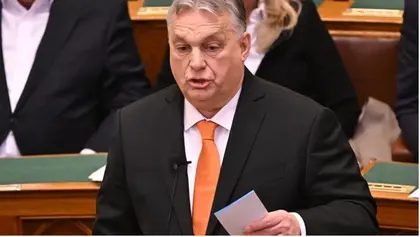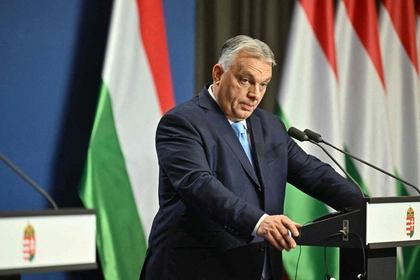The Hungarian National Assembly, the Országgyűlés, voted on Monday to endorse Sweden’s long-delayed bid to join NATO – the final hurdle making the Nordic nation NATO’s 32nd member and finally ending what has been an almost two-year impasse.
It is possible that Stockholm could be formally inducted within the week and, thereby, complete the process that began with Finland and Sweden bidding to end their traditional neutrality in response to Russia’s 2022 invasion of Ukraine. Finland became the 31st member of the Alliance on April 4 2023.
JOIN US ON TELEGRAM
Follow our coverage of the war on the @Kyivpost_official.
The addition of these two Nordic countries not only strengthens NATO’s strategic position in the region and the Baltic Sea but sends a strong message to Moscow of the opposition to its military ambitions.
The probable agreement of Hungary was strongly signaled by a meeting between the Swedish Prime Minister, Ulf Kristersson, and his Hungarian counterpart, Viktor Orban in Budapest on Friday. After discussions on defense and security cooperation they announced the signing of a contract for Hungary to acquire four Swedish-made Gripen fighter aircraft.
Of the 194 members of Hungary’s parliament who voted to approve the accession, only six voted against.
“Today is a historic day,” Kristersson said on X shortly after the vote. “Sweden stands ready to shoulder its responsibility for Euro-Atlantic security.”

Sweden’s Latvia NATO Deployment – What We Know
NATO’s Secretary-General Jens Stoltenberg confirmed on X that Sweden will become a member of the bloc now that all allies have approved its bid to join.
“I welcome the Hungarian parliament’s vote to ratify Sweden’s membership in NATO. Now that all Allies have approved, Sweden will become the 32nd NATO Ally. Sweden’s membership will make us all stronger and safer,” he said.
The fact that with Sweden’s accession, NATO will now consist of 32 allies is, to many, an ironic twist given that Russia claims its war against Ukraine was partly an attempt to resist the alliance’s growth along Russia’s border. The accession of Finland added around 1,300 kilometers (830 miles) to the Alliance’s frontier with Russia.
In turn, as NATO member states, Finland and Sweden will enjoy the protection granted the treaty’s Article 5, which states that an attack on one member is considered an attack against all.
Sweden’s request for membership had been held up for some time by Hungary and Turkey over a variety of political issues. Turkey finally agreed to accept Sweden on Jan. 23, after some 20 months delay.
It was reported that, shortly after the Turkish vote, Orban informed Stoltenberg that Budapest would now support Swedish membership and underlined the intention to do so again during his state of the nation speech on Feb. 17.
“Hungary has a vested interest in Europe’s security,” government spokesman Zoltan Kovacs said after Monday’s vote. “In Sweden we have a strong and reliable ally who will benefit the future of NATO for the better.”
While Orban was publicly supportive of Sweden’s bid, NATO allies were concerned as Hungary spent months stalling. Budapest’s foot-dragging elicited concerns that Orban, the EU leader closest to Putin, was acting in a manner that benefited the Kremlin.
In recent weeks, however, Europe has had some success in getting Hungary to fall in line with the bloc’s foreign policy goals. Budapest earlier this month dropped its objections to an EU funding deal for Ukraine worth $50 billion, which Orban had vetoed in December on procedural grounds. Orban’s critics had accused him of blocking the deal in response to the EU’s decision to withhold funds earmarked for Hungary. Hungary denied there was any connection between the two.
Sweden’s accession to NATO comes at a crucial time in the war in Ukraine, as some of its allies and other Western nations struggle to retain the levels of funding and political will still needed to support Ukraine’s fight against Russia.
You can also highlight the text and press Ctrl + Enter










